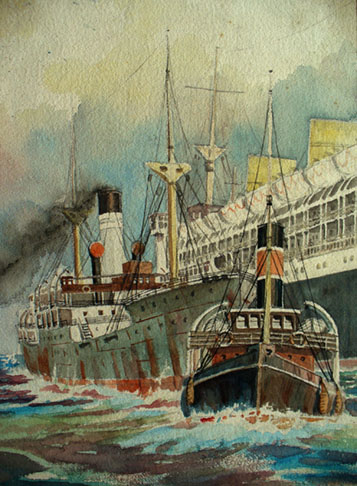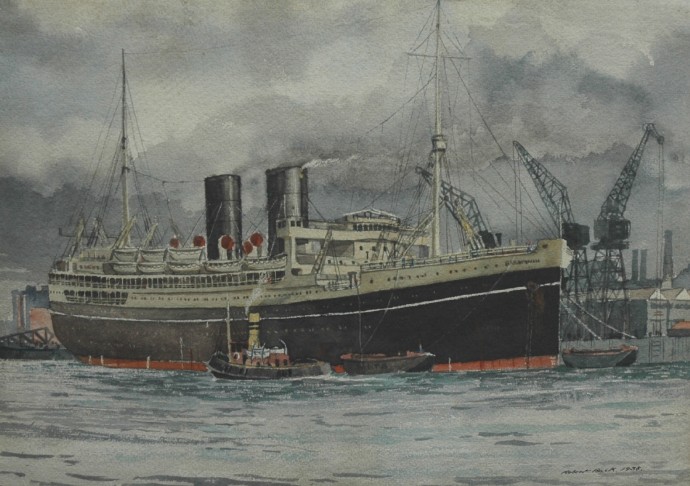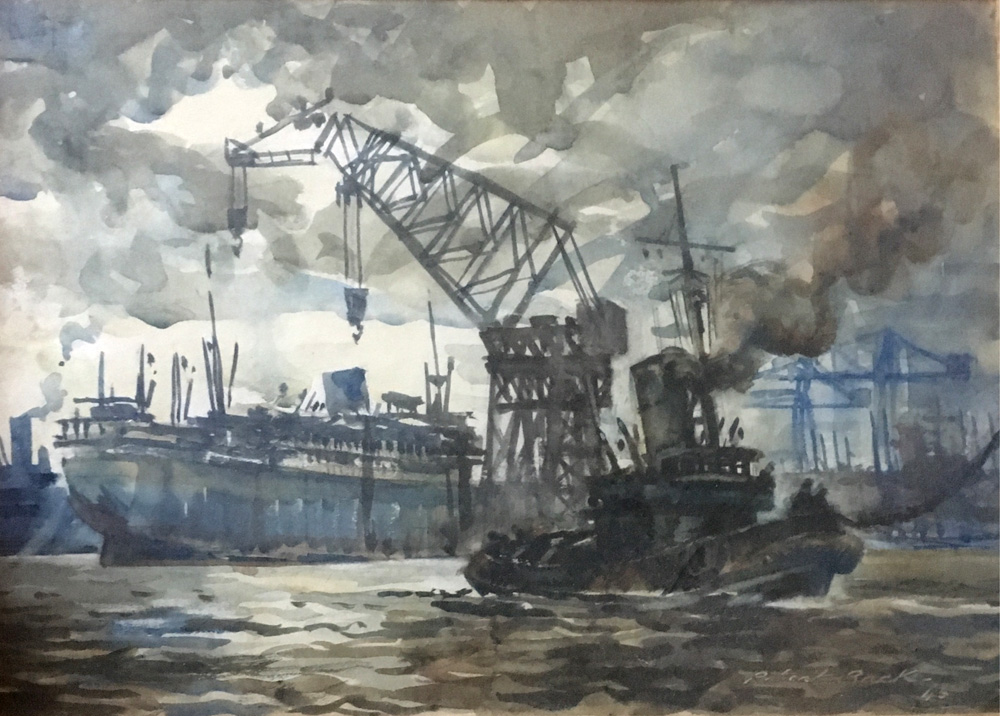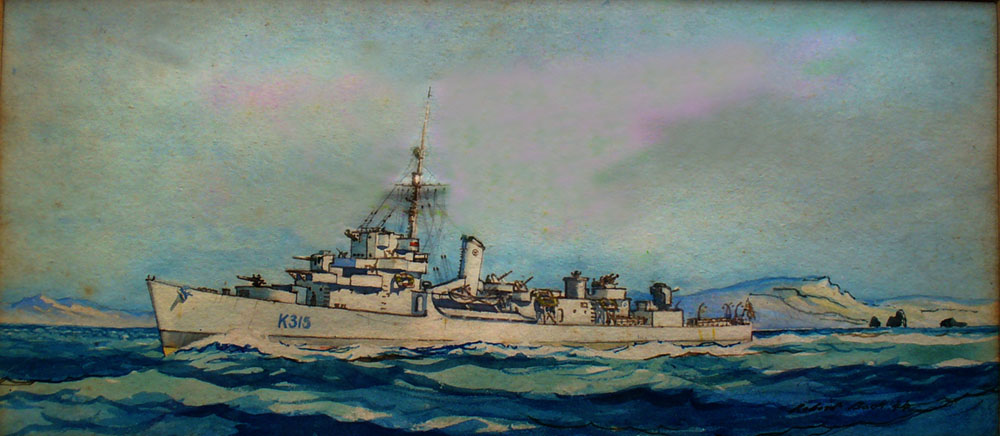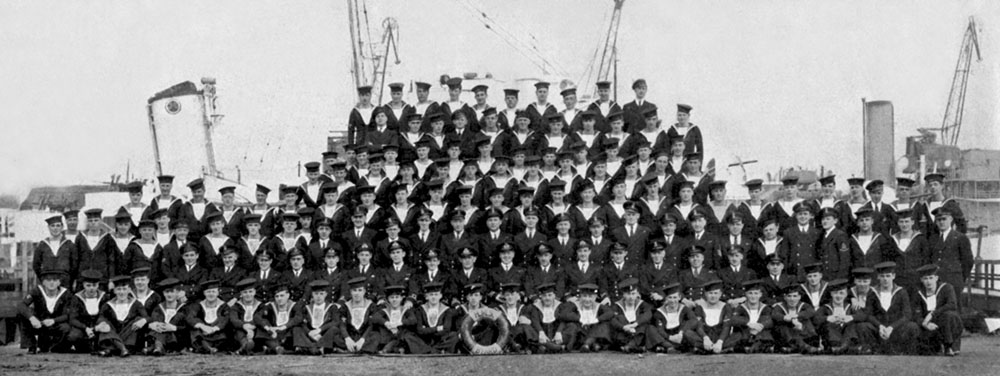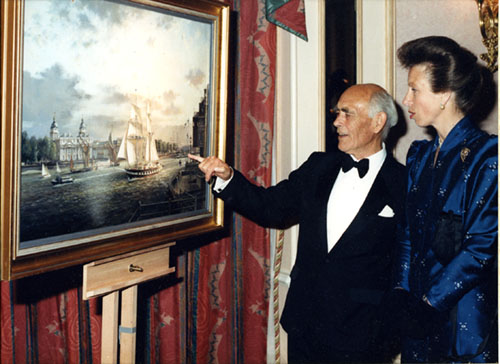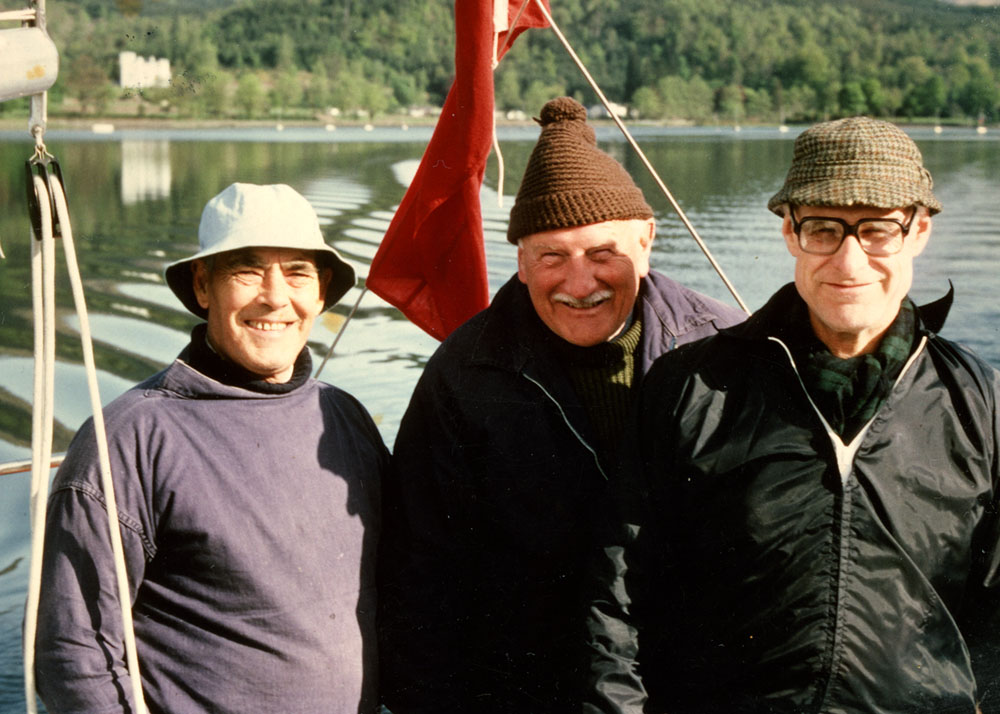A HARD FOUGHT SHIP
The
story of HMS Venomous
Robert Trenaman Back
Robert
Trenaman Back (1922-2004) was born in Adelaide, South
Australia, the son of William Back, a frustrated artist turned
aircraft designer, who had emigrated to Australia after the Great War.
"I inherited a family tradition of the sea from both my father's and my
mother's sides of the family. In 1833 my ancestor, Captain George Back
RN, sailed in search of the North West Passage. Two cousins were
admirals in the First World War" (Prints 1984 6(2) March / April).
The family returned to England when his his fa ther inherited the family
estate in Norfolk in 1931 and the long voyage on the Jervis Bay
aroused his interest in the sea. Robert was educated at St George's
Chapel, Windsor, and at Felsted where he won the school artist prize in
three successive years. During
the holidays he learned to sail on the Norfolk Broads in his
father's old fourteen foot clinker built boat, Ursula.
In later life in an
interview with Prints (March /
April 1984) he recalled
that in 1938 "I joined a dirty British coaster with a tall black
smokestack
at Great Yarmouth, with a pass in my pocket to allow me to sketch in
the London Docks. I
remember Lord Courtauld buying a dockland water colour of mine for five
shillings". He
was only fifteen when he was awarded the President's Prize of the Royal
Drawing Society by The Princess Louise, Duchess of Argyll, for
"Snapshot Drawing - Old Tramp Being Towed Past Tilbury" (on left
below). A water colour of SS Parapindi
(on the right) painted in the
London docks when he was a sixteen year old schoolboy is one of several paintings of his being offered for sale
by the Dutch art gallery, Simonis Buunk,
at somewhat higher prices. The painting of a harbour scene below
by A/B Robert Back D/JX 306375 was done while serving in HMS Byard, a Captain Class Frigate.
He won a scholarship to study at the Edinburgh College of Art where "I
soon learned to hide my watercolours and never mention marine art,
because it was considered unimportant to great art". After
a year he volunteered for the Royal Navy and in March 1942 Robert Back JX306375 was posted to HMS Venomous as a gunner in time for arctic convoy PQ.15 to
Murmansk:
"the
forward mess deck was constantly awash with sea water. Any blankets
dropped on the deck were doomed to stay wet for the next nine days; we
slept in our clothes. No matter how much we wrapped up for a four hour
watch, within the first ten minutes the cold was through to the bones.
Hours were spent chipping ice off the guns. I remember one occasion,
following behind a Russian ice breaker in line ahead, we had an enemy
air attack and every gun on the ship had frozen."
Before leaving the Clyde for the Mediterranean to escort the convoy
which relieved Malta Robert Back was:
"doing
a pencil sketch of an armed merchant cruiser anchored in the Clyde. I
was in the lounge bar of the Bay Hotel, which happened to be full of
merchant seamen. 'That's nice' said a voice from behind me, 'can I have
a look?' In a minute I replied, 'I will just finish it off'. After a
few more questions, I was aware all eyes were on me, and there was a
deathly hush. The two gentlemen behind me were plain clothes police!"
He was escorted out of the
hotel, his sketch book confiscated, and he was warned he would hear
more from his ship's captain. Eventually his sketch book was returned,
having had each drawing stamped and passed by His Majesty's Censor.
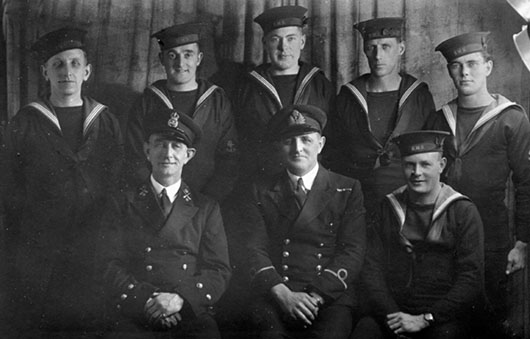
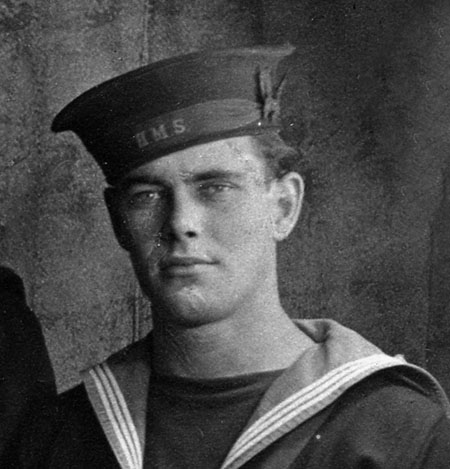 Studio portrait of Robert T. Back and his fellow Gunners at HMS Bristol in 1943
Rear from left: Jock Dick, Fred Bing, Ted Tudor, Len Alston, Myself (RT Back)
Studio portrait of Robert T. Back and his fellow Gunners at HMS Bristol in 1943
Rear from left: Jock Dick, Fred Bing, Ted Tudor, Len Alston, Myself (RT Back)
Front from left: ‘Chiefy’ Fenton (Gunners Mate), ‘Gunns’, Ernest Buckley.
In September 1942 AB Robert
Trenaman Back JX306375 was posted to HMS King Alfred at Hove (Brighton)
for officer training so he was not aboard HMS Venomous
when she rescued the survivors of HMS Hecla.
He was not commissioned and was posted to HMS Bristol,
the shorebase in Bristol, where this studio photograph was taken. His
portrait is cropped from a group photograph of Back and his fellow
gunners with their names written on the reverse. Had they served together in HMS Venomous?
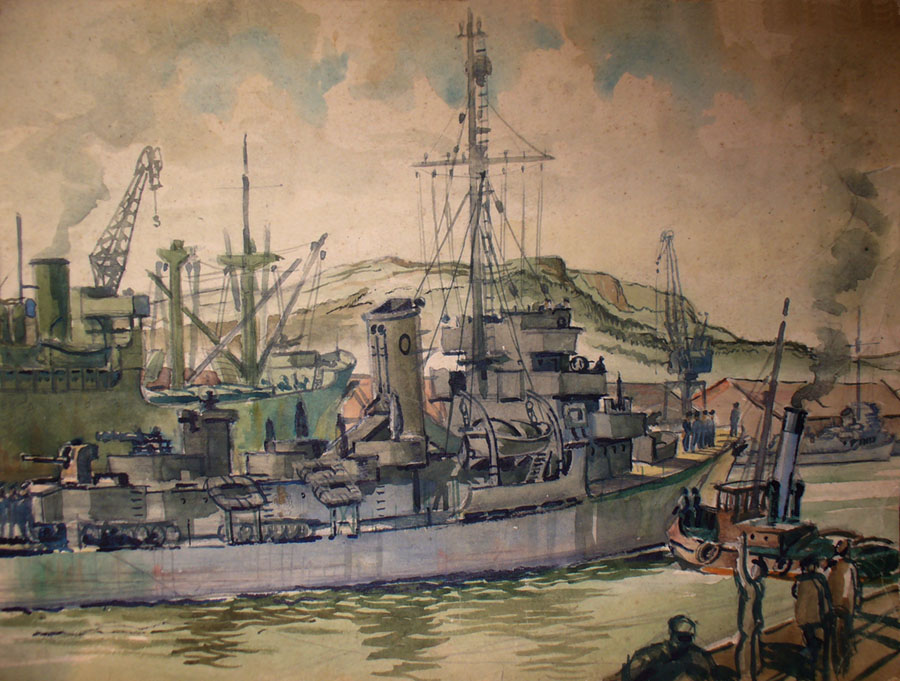 HMS Byard, a Captain Class frigate,
built near Boston in 1943
HMS Byard, a Captain Class frigate,
built near Boston in 1943
Courtesy of Alison Travis, daughter of Robert Back
The ship's company of HMS Byard with R.T. Back on left in second row from front
From "Reminiscences of the Spirited Horse"
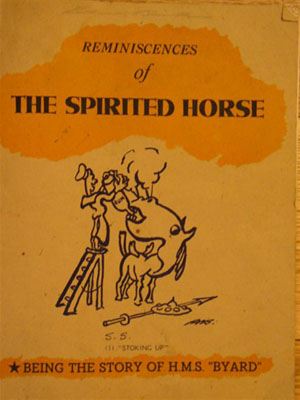
Only two of his wartime painting are known today, the Captain Class frigate in a busy harbour is probably HMS Byard, which he joined soon after
leaving Venomous. The other with the pennant number of HMS Byard (K315) clearly visible is badly water damaged. HMS Byard was built near Boston in 1943
under the lend-lease programme and from January to June 1944
had an American captain, Lt Cdr E.M. Ferris RNVR, who had enlisted in
the Royal Navy in Canada before America entered the war. He was the
first US citizen to command one of His Majesty's ships. On arrival in
Britain Byard was stripped
of her dishwasher and ice cream machine and joined the Fourth Escort
Group at Belfast.
Robert Back probably joined Byard
in November a month after it had sunk U841 and rescued twenty seven
survivors while escorting an Atlantic convoy. For most of 1944 Byard was in
the Mediterranean escorting converted passenger liners being used as
troop carriers to Naples. From November 1944 until VE-Day Byard
was in the English channel and Irish Sea hunting down the new schnorkel
equipped U-boats. These brief details of Byard's wartime activities are
taken
from a wartime history of the Fourth Escort Group and HMS Byard written by "Henry" (Mr J.H. Hathaway, Temp. Wt. Eng. RN), illustrated with cartoons by Robert Back,
and privately published as Reminiscences
of the Spirited Horse in June 1945.
"On returning to
England after the end of hostilities ... I found my Norfolk home half
demolished by a flying bomb. Fortunately, nobody was killed." He was a
passionate dinghy sailor and with his 65 year old father as crew he sailed his Uffa Fox designed dinghy, Shrimp, to victory in all six races during Regatta Week on the Broads and in 1950 he was an Olympic trialist for the Helsinki Games.
When he
completed
his studies at the College of Art in Edinburgh in 1949 he found it
impossible to get a job as a commercial artist in advertising in London
and turned to teaching art at a school in Northern Ireland for a year.
This was followed by a period
selling Dexion industrial shelving and as sales manager of a turkey
farm before going to sea in
the Merchant Navy for five years on the liner, Edinburgh Castle, and the Royal
Mail ship, Alcantara.
"Before
long I was back at sea, this time at the wheel of a 29,000 ton liner
sailing out of the Solent for South Africa. I had never helmed any ship
that size in my life but nobody knew. Four hours on, eight hours off,
gave me plenty of time to paint portraits of the crew for £1 a picture.
Apart from exercising French poodles or oiling Dennis Compton's cricket
bat, there was little chnce of an extra bob on one's salary." From the interview with him in Prints, March / April 1984.
He met his wife, Denise, a
speech therapist in
Edinburgh in 1957 and they married the following year. They had two
daughters, Clare and Alison. He left the sea after marrying and
returned to teaching art at Seaford,
Sussex, and built a studio in the attic of his cottage. He
crewed in the Admiral's Cup and the Fastnet Race in
1965 and continued to sail into his sixties: "I have a fine geriatric
crew and have taught them all to sail. My retired bank manager cooks
for us and looks after the money; my church organist offers up a hymn
and a prayer, and my solicitor looks after the legal side should we
ever get bumped." He
lived in Seaford for 46 years and was a much liked if eccentric figure
in the town.
Left: Robert Back showing Princess Anne his painting of the Sea Cadet Training Ship TS Royalist sailing through Greenwich
Right: Robert Back (centre) with his "geriatric crew"
Courtesy of Alison Travis
His reputation as a marine artist took off when he was
"introduced to Malcolm Henderson who had a gallery in London.
When Henderson moved to America, Back's market moved with him. In 1983,
he had his first major American exhibition at the Atlantic Gallery in
Washington, others following" (from his obituary in the Independent, 12 July 2004).
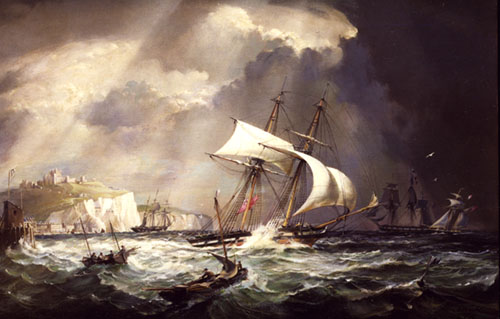
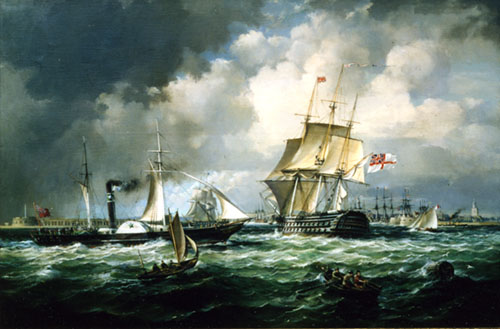 Left: Schooner yacht, Flower of Kent, leaving Dover, circa 1840
Left: Schooner yacht, Flower of Kent, leaving Dover, circa 1840
Right: The Steam Packet North Star astern of Nelson’s Old Flagship, HMS Foudroyant, off Portsmouth, circa 1850
Courtesy of Alison Travis - artist signed prints available
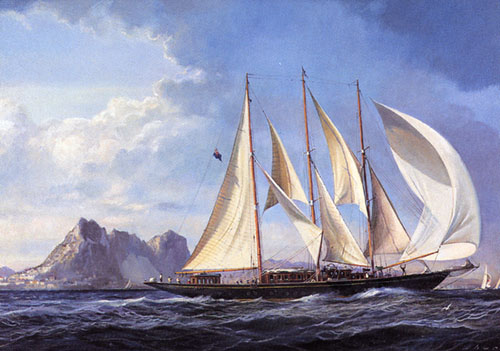
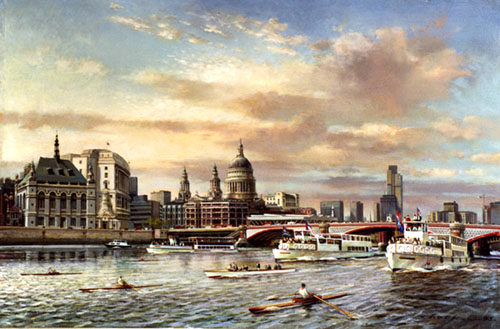 Left: Sir Thomas Sopwith's yacht Creole off Europa Point, Gibraltar
Left: Sir Thomas Sopwith's yacht Creole off Europa Point, Gibraltar
Right: The 1993 Doggett Coat and Badge race for City of London Lightermen and Watermen in single sculls
Courtesy of Alison Travis
His success was based
on his historically
accurate meticulously detailed oil paintings of eighteenth and nineteenth
century warships
in historical settings which were very different from his prewar
drawings and water paintings of merchant ships and his only known wartime
painting. Prints magazine summed up his appeal:
"His
success lies in his talent as a romantic painter. He has a sense and
understanding of the sea which allows him to exagerate the drama of a
scene and at the same time maintain its realism. Like the successful
historical novelist, Robert gives the facts as seen through the eyes of
the contemporary observer, adding nuances which spike ones sense of
occasion, balancing known facts with plausible fiction."
His paintings can be seen in public galleries and private collections
in America as well as in this country.
Signed prints of some of
Robert T. Back's paintings are available from his family.
E-mail his daughter Alison Travis for further
details
The South African architect and war artist, Herbert H. McWilliams, was rescued by Venomous when HMS Hecla sank
Follow
in the wake of HMS Venomous
on this web site
And
find out why the "Hard Fought Ship" was "Verminous"
Holywell House Publishing
88 Holywell Hill, St
Albans, Hertfordshire AL1 1DH, Britain
http://holywellhousepublishing.co.uk
Telephone: +44 1727 838595
contact online







